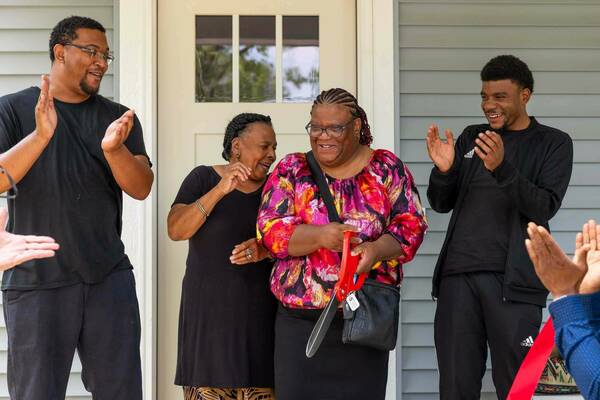New homelessness prevention toolkit empowers communities with proven, cost-effective way to keep families housed
A new homelessness prevention toolkit is now available to help cities and counties across the country take a proactive approach to reducing homelessness. Developed through a collaboration among the Wilson Sheehan Lab for Economic Opportunities (LEO) at the University of Notre Dame, Results for America and Destination: Home, this toolkit equips communities with a data-driven approach to keep families housed and avoid the costly and disruptive consequences of homelessness.
The toolkit, accessible on Results for America’s Economic Mobility Catalog, provides a step-by-step guide for launching, operating and managing an effective homelessness prevention system. Built on findings from a LEO study conducted in Santa Clara County, California, it offers a structured framework that local leaders nationwide can customize to fit their communities.
“Our partnership with Destination: Home did not end with the completion of the homelessness prevention research in Santa Clara or the publication of the journal article,” said Brendan Perry, assistant director of replication and scale at LEO. “This toolkit is a perfect example of how LEO is putting evidence into action, empowering communities across the country with a proven approach to preventing homelessness.”
In the California study, LEO researchers found that targeted financial assistance — for example, helping families pay their rent or utility bills — significantly reduced the likelihood of homelessness. The study, which evaluated families in Santa Clara County at imminent risk of homelessness, revealed that individuals who received financial assistance through the county’s Homelessness Prevention System were 81 percent less likely to become homeless within six months and 73 percent less likely to become homeless within a year.

The new toolkit breaks down the six key phases of implementing such a homelessness prevention system: assessing community needs, mobilizing a coalition, designing the program, securing funding, managing the system and evaluating success.
“Homelessness prevention is a proven solution that will keep families in their homes and save taxpayers money, and Santa Clara County has the evidence to back it up,” said Ross Tilchin, director of the Economic Mobility Catalog at Results for America. “Results for America is proud to partner with LEO and Destination: Home to release this implementation resource to help even more cities and counties ensure that their residents remain safely housed.”
Many homelessness interventions focus on providing shelter to people already experiencing homelessness — but prevention efforts such as providing financial assistance to at-risk households can reduce long-term societal costs and provide more stable solutions. LEO’s research estimated that for every $1 spent on financial assistance, communities receive $2.47 in benefits, making it a high-impact, cost-effective intervention.
In addition to highlighting the efficacy of prevention compared to shelter-based responses, the toolkit also provides insights into how to effectively target funding to people most at risk.
The toolkit reflects a shared commitment to ensuring research informs real-world solutions. LEO and Destination: Home will actively work with new communities to implement this toolkit, adapting it to local contexts and studying its effectiveness in different regions to further refine and expand evidence-based homelessness prevention strategies.
Destination: Home, a public-private partnership working to end homelessness in Silicon Valley through collaborative efforts and innovative solutions, has been instrumental in implementing these strategies and gathering data to support their effectiveness.
The homelessness prevention toolkit is now available for download on the Economic Mobility Catalog run by Results for America, a nonprofit that helps policymakers at all levels of government harness the power of data and evidence to make more effective decisions that improve lives. Community leaders, policymakers and nonprofit organizations are encouraged to explore the resource and implement its insights to create lasting change in their regions.
The Wilson Sheehan Lab for Economic Opportunities (LEO) at the University of Notre Dame partners with service providers to conduct rigorous research that identifies effective solutions to reduce poverty and homelessness. By applying scientific evaluation methods, LEO ensures that proven interventions reach those who need them most.
Contact: Tracy DeStazio, associate director of media relations, 574-631-9958 or tdestazi@nd.edu
Latest ND NewsWire
- Researchers deconstruct chikungunya outbreaks to improve prediction and vaccine developmentThe symptoms come on quickly — acute fever, followed by debilitating joint pain that can last for months. Though rarely fatal, the chikungunya virus, a mosquito-borne illness, can be particularly severe for high-risk individuals, including newborns and older adults. While the virus is common…
- Eck Institute investigator to strengthen postpartum care for Indiana mothersYenupini Joyce Adams, associate professor of the practice and maternal health lead for the Eck Institute for Global Health at the University of Notre Dame, is partnering with Beacon Health System to pilot a new, first-of-its-kind postpartum care model in the South Bend-Elkhart community.
- Gen. Martin Dempsey to speak at Notre Dame Forum event on ‘Hope, Global Stability and the Role of the United States’Gen. Martin Dempsey, the retired 18th chairman of the Joint Chiefs of Staff, will join University President Rev. Robert A. Dowd, C.S.C., for a fireside chat at 4 p.m. Friday (Oct. 10), as part of the 2025-26 Notre Dame Forum. The discussion, titled “Hope, Global Stability and the Role of the United States,” is part of the exploration of this year’s Notre Dame Forum theme, “Cultivating Hope.” It will take place in Rooms 215/216 of McKenna Hall and will also be livestreamed. The event is free and open to the public.
- University of Notre Dame joins the Global Coalition of Ukrainian StudiesThe University of Notre Dame has joined the Global Coalition of Ukrainian Studies after signing a memorandum of cooperation, formalized Sept. 24, at the Ukrainian Institute of America in New York City. Notre Dame joined four other American institutions that were also publicly welcomed to the coalition at this event: Arizona State University, Columbia University, Manor College and the Shevchenko Scientific Society.
- One year later, Inauguration Build a ‘dream come true’ for Habitat familiesOne year later, work on Inauguration Build 2024 is complete, offering shelter and so much more to five local families.
- Alumni Association and YoungND honor 2025 Domer DozenThe Notre Dame Alumni Association announced its 2025 Domer Dozen cohort, honoring 12 graduates ages 32 and younger for excellence in their contributions in learning, service, faith and work — the core pillars of the association’s mission.













